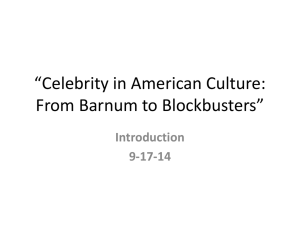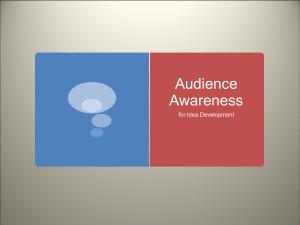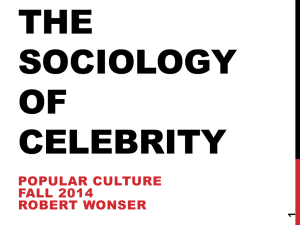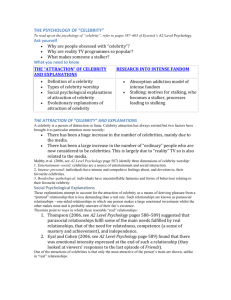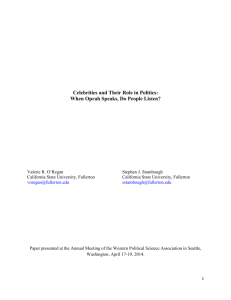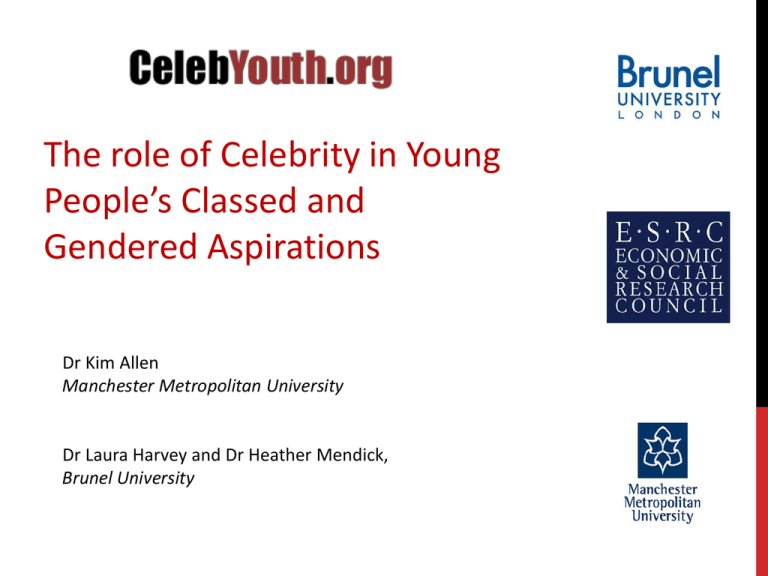
The role of Celebrity in Young
People’s Classed and
Gendered Aspirations
Dr Kim Allen
Manchester Metropolitan University
Dr Laura Harvey and Dr Heather Mendick,
Brunel University
Political context:
Aspiration nation?
Low aspirations, ‘work-shy’ youth and celebrity
“Britain's teens need to learn about work ethic from immigrants” - Boris Johnson, 2013
“X Factor culture fuelled the UK riots… Kids believe that their stepping stone to massive
money is The X Factor. Luck is great, but most of life is hard work. We do not celebrate
people who’ve made success out of serious hard work.” - Iain Duncan Smith, 2011
“Kids nowadays just want to be famous. If you ask little girls, they either want to be
footballers' wives or win The X Factor … Our society is in danger of being Barbie-dolled.“ Barbara Follett MP, 2008
Folk Devil? Young People’s voices?
The project
September 2012- August 2014
Our research questions:
1) What discourses of aspiration
circulate in celebrity
representations?
2) How do young people use
these discourses in constructing
their aspirations?
3) How are the discourses of
aspiration in celebrity and their
uses classed and gendered?
Data collection
144 young people
6 secondary schools (11-18) in
England, rural and urban,
reflective of local demographics
24 group interviews with 6
students each (Year 10 & Year 12)
Follow up individual interviews
with about 8 students per school
12 celebrity case studies
*Data collection complete (July
‘13). Currently analysing the data.
Some emerging findings….
How might these be made genuinely useful
to you in your work?
Group interviews
Group interviews:
We asked about:
• Liked/ disliked celebrities
• Any celebrities they would like to be/ have their job/ life
• What makes someone a celebrity
• How they consume celebrity culture
We are now exploring themes and patterns in the group
interview data.
Celebrities and ‘hard work’
Contrary to policy and public discourse, young people show a
strong investment in hard work as central to and necessary
for success and future happiness
Celebrity talk is a key way in which investments neoliberal
discourses of meritocracy – success via hard work – are
performed and negotiated
What counts as hard work is gendered and classed, being
read onto some bodies and forms of labour and not others
Evaluations of hard work are not fixed but shaped by young
people’s personal investments, resources and positioning
‘He trained so hard he vomited’:
Displaying your worth
Dave: I think it can go two ways, You’re either a celebrity who’s
earned what you have, or you’re a celebrity who got lucky.
Kim: And so what, what do you, okay, so for those who’ve
earned what they’ve got, what’s that through, do you think?
Is it talent, or hard work?
Dave: It’s talent. Talent, obviously. Like Usain Bolt, he is, he has
a lot of talent for running, but he also has to train that talent
for. I think it’s been twelve years that he’s competed.
Jerome: Do you remember that thing we watched in German,
where the, The Life of Usain Bolt, and he trained so hard that
he actually vomited.
Self-sufficiency: The power of the
individual
• These ways of speaking connect to powerful ideas
circulating in UK society about the role of the individual in
shaping their future (e.g. Conservative’s ‘hard working
Britain’). Celebrity talk as a resource for young people
through which to negotiate stories about meritocracy.
• Success or failure is seen as a reflection of individual
determination and drive
• Obscuring of the presence of forms of class, gender and
race inequality in shaping young people’s school-to-labour
market transitions.
What counts as ‘hard work’? The significance
of class and gender
Dave: Reality TV stars and models like Kim Kardashian, they’re at
the bottom of the celebrity pit ... they’ve done nothing.
Saafi: You know Kim Kardashian all she did was a sex tape
[laughter] and then got famous … I think they appreciate it
more when they’ve had to work for it. I don’t like it when it's
like they've not had to do anything to get that and they’re
gonna take it for granted.
Kirsty: They’d have to work for it, I think. I think it would be
better if they worked for it.
We are interested in how dominant stories about what kinds of work (and
which kinds of people) are valued in these powerful social stories, and
consequently, who and what are excluded?
Ally:
And how did she do modeling? Oh, just lift up her top, simple.
Mavie: I’m not being funny, you always bring in the newspaper and flash
that around anyway. ...
Ally:
That’s one of the worst ways you can earn money. It’s a rather
sad way of earning money as well.
Mavie: I don’t think you can judge people.
Ally: She’s not talented in any way, is she?
Mavie: She’s got a good business.
Luigi: Yeah, she’s made a lot for herself, even though she...
Ally: Yeah, she’s got a good business, but is it her that created it? And is
it her that done all the stuff? No.
Mavie: Yeah, for her kids.
Ally: She’s not a business woman, I’m telling you now, Katie Price is not
a business woman…. she’s pathetic, honestly
Mavie: No, she made it all.
Celebrity Case Studies
What we did and why
Explore what discourses of aspiration (‘talent’, ‘success’, ‘ambition’
‘work’, etc) circulate in celebrity representations
12 celebrities selected based on who generated most discussion
among participants (equal split male and female; range of ‘fields’)
Justin Bieber
Prince Harry
Will Smith
Tom Daley
Kate Middleton
Nicki Minaj
Emma Watson
Kim Kardashian
Bill Gates
Mario Balotelli
Katie Price
Beyonce
Tracking and textual analysis of media coverage of each over 6
months across key outlets incl. public discussion about them
Sources include: key texts / outputs (e.g. the celebrity's films,
biographies, music); ‘traditional’ press (e.g. national papers) and
social media (e.g. Twitter; YouTube)
Tweets about Will Smith: a dream father and
motivational ‘guru’
‘Life would be great if Will Smith was your father’
’This is an antidepressant. Will Smith dancing’.
‘You got a dream? Protect it. People can’t do something
themselves, they tell you you can’t do it. You want
something, go get it. #WillSmith’
‘I like that quote from will smith's movie, after earth, “Fear is a
choice but don’t misunderstand me danger is real but fear is
a choice.”’
’Don't let success get to your head, and failure to your heart Will Smith’
Will Smith: ‘Secrets of Success’ video
(2.5 million hits)
“Where I excel is ridiculous, sickening
work ethic. While the others guy’s
sleeping, I’m working… I’m not afraid to
die on a treadmill. You might be more
talented than me, smarter than me, but if
we get on the treadmill, there’s too things:
you’re getting off first or I’m gonna die”
“Whatever goal you want to reach,
whatever you want to do in life, your
success originates from your attitude”
Will Smith on Obama, racism and success:
‘When Barack Obama won, it validated a piece of me that I
wasn’t allowed to say out loud – that America is not a racist
nation. I love that all of our excuses have been removed. …
There’s no white man trying to keep you down, because if
he were really trying to keep you down, he would have
done everything he could to keep Obama down. ….I’m an
African American, and I was able to climb to a certain point
in Hollywood. On that journey, I realized people weren’t
trying to stop me. Most people were trying to help me.… If
Barack Obama can win the presidency of the United States,
you can absolutely be the manager at Saks.’
So what?
In many ways, Will can be seen to provide a ‘good role model’,
encouraging young people to believe that they can do anything in
life as long as they work hard and don’t give up
But can they? Why are we cautious?
• Despite young BME men obtaining good educational qualifications,
their unemployment rates are higher than for their white
counterparts. e.g. African graduates in their 20s are seven times as
likely to be unemployed as their white counterparts (Joseph
Rowntree Foundation 2013)
• 25.7% of white applicants to Oxford received an offer, compared
with 17.2% of students from ethnic minorities (Guardian Feb 2013)
So, does Will Smith provide post-racial fantasies of meritocracy
which obscure the presence of racial inequalities and discrimination
affecting young people’s opportunities and transitions and cant
easily be overcome through hard work and determination?
Individual Interviews
What did we ask?
Biographical information
Local area and other areas where they’ve lived, their family
Imagine these celebrities went to your school...
Who they’d befriend and avoid, how the celebrities would fare
socially and academically
Aspirations and choices
Happiness and success for celebrities and personally
Choices and aspirations, how they’re making these and any
associated memories
Youth and Inequality
General and personal difficulties for young people in achieving
their dreams
What it’s like to be young, differences by gender, social class
and generation
Mariam
Somali Refugee; Muslim; 17 years old
Inner-city academy in Manchester
Lives in Moss Side: likes local area; ‘multicultural’; spends most of
her time with family
Single mother and sisters; estranged from her father; mother
studying ESOL and seeking part time work
Working–class but self-defined as ‘in the middle’
Fractured transitions and disrupted schooling
Celebrities: hard work, talent and deserved
success
Hierarchy of good/ bad celebrity - hard work and talent central
Avoid ‘famous for nothings’; celebrities like Beyonce, Tom and Bill who
‘start from nothing will be happiest because of what they’ve achieved’.
Role models?: ‘I’d think if they can do it, I can do it’
Beyonce: ‘cool’ and inspirational: ‘she shows you can do a lot without a
man’ (e.g. having an all female band, and sacking her dad as her boss)
Relate to self-perception: individualised explanations for success:
‘What might stop people achieving their dreams? If you work hard you
will achieve your goals…. I guess, I need to change myself and be more
determined to get what I want’
Mother, grandmother and Beyonce:
Struggle, Strong women and Independence
Modest aspirations: Stable life, good job and happy family: ‘I just want a
good life – not a million pounds’
Proving herself to others: Showing her father that she can do well
without his help; inspiration for younger cousins
Feminist narrative: mother and grandmother as role models:
‘My mother showed me how to be a good mother
without having a job and an education, and my
grandmother showed me to be a good woman and
mother with a job because she worked for my
Aunties and uncles, so they both did it on their own’.
Memories: a sideways look at young
people’s aspiration
Fashion careers and popular culture
Aspirations to go to a local college and take vocational course
related to fashion and marketing
Interest in pursuing a career in fashion promotion
MTV’s ‘The Hills’ : ‘‘I used to watch it
everyday, it stayed in my mind’
Seemingly ‘trashy’ reality TV
Sparked Mariam’s aspirations.
Celebrity as merely fantasy
or more than this?
Discussion
• In your own practice, what challenges do you face
around young people and aspiration? (at individual, local
and national level? Government policy? Reduced funding and devolution
of careers education? Local and national labour market/ youth
unemployment?)
• How do our initial findings relate to your work and
the challenges you face?
• How can we make our findings useful to you / your
profession? What kinds of ‘outputs’ would genuinely
support you in your work?
@CelebYouthUK
CelebYouth UK

